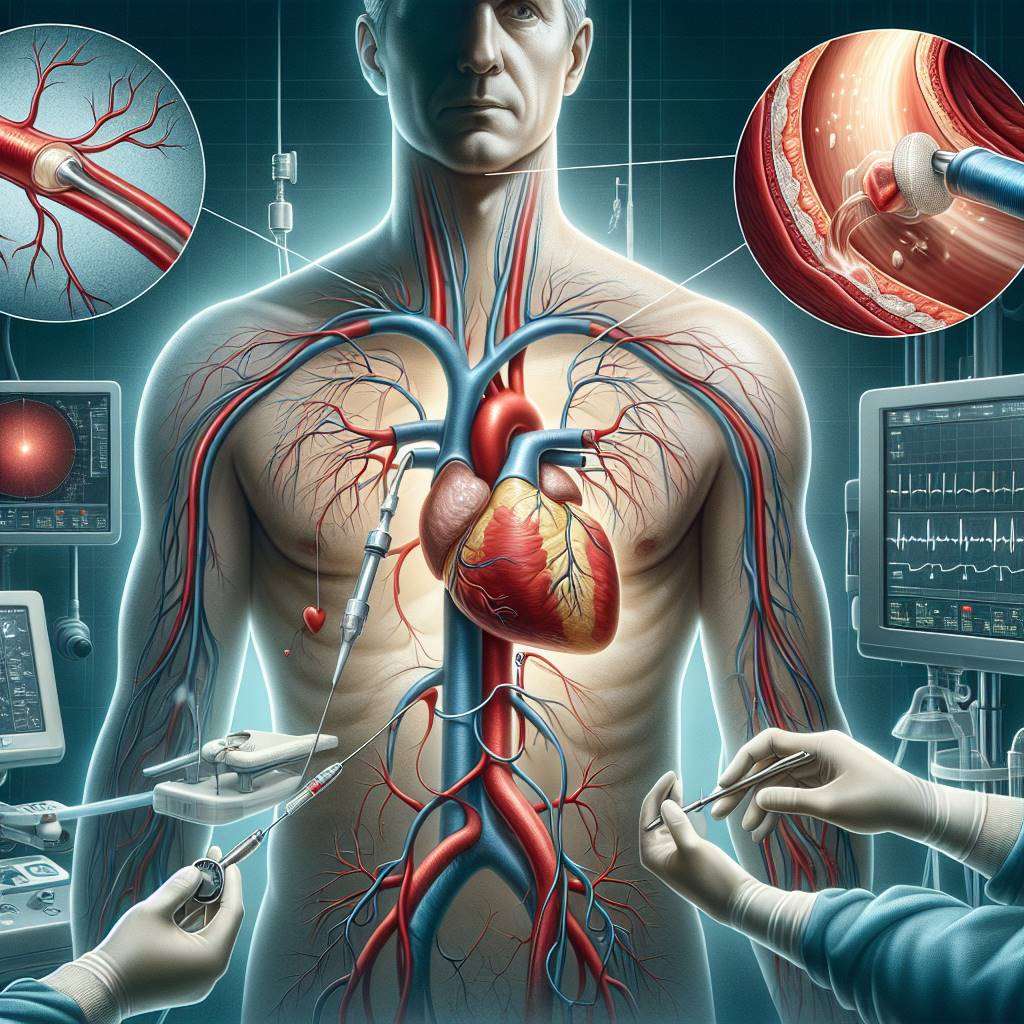Angioplasty is a common procedure to restore blood flow in blocked arteries, but it may not always yield the desired results. When angioplasty fails, patients may face recurring symptoms or complications, requiring further medical intervention. Understanding the reasons behind failure is crucial for effective management and improved outcomes.
Medical disclaimer: This content is for general awareness and does not replace a doctor’s consultation. For diagnosis or treatment decisions, consult a qualified specialist.
Failure of angioplasty can occur due to factors like restenosis (re-narrowing of the artery) or improper stent placement. Patients and caregivers must be aware of alternative treatments and next steps to ensure heart health. Timely action and consultation with a cardiologist can significantly improve prognosis and quality of life.
Understanding Why Angioplasty May Not Always Work
While angioplasty is effective for many patients, it is not a guaranteed solution for all. One common reason for failure is restenosis, where the treated artery narrows again due to scar tissue formation. This can occur within months of the procedure and may lead to recurring symptoms like chest pain or shortness of breath.
Another factor is stent thrombosis, a rare but serious complication where a blood clot forms around the stent. Additionally, improper stent placement or underlying conditions like severe arterial calcification can reduce the success rate of angioplasty. Understanding these risks helps patients and doctors plan for alternative treatments if needed.

Signs and Symptoms of Angioplasty Failure
Recognizing the signs of angioplasty failure is critical for timely intervention. Common symptoms include persistent or worsening chest pain (angina), shortness of breath, and fatigue. These may indicate that the artery has re-narrowed or that the stent is not functioning as intended.
In some cases, patients may experience symptoms of a heart attack, such as severe chest discomfort, nausea, or dizziness. It is essential to seek immediate medical attention if these occur. Regular follow-ups with your cardiologist and diagnostic tests like stress tests or angiograms can help detect issues early.
- Recurring chest pain or angina
- Shortness of breath
- Fatigue or reduced exercise tolerance
- Heart attack symptoms (e.g., nausea, dizziness)
What to Do Immediately After Angioplasty Fails
If angioplasty fails, it is important to act quickly to prevent further complications. The first step is to consult your cardiologist to assess the situation. They may recommend additional diagnostic tests, such as a coronary angiogram, to determine the cause of failure and the extent of arterial blockage.
In the meantime, patients should manage their symptoms by adhering to prescribed medications, such as antiplatelet drugs or blood thinners, to reduce the risk of clot formation. Lifestyle modifications, including a heart-healthy diet and avoiding smoking, are also crucial. Prompt action can help stabilize the condition and prepare for further treatment options.
Exploring Alternative Treatments After Angioplasty Failure
When angioplasty is unsuccessful, alternative treatments may be necessary to restore blood flow and manage symptoms. One option is repeat angioplasty, where the procedure is performed again, often with a different type of stent. This may be effective in cases of restenosis or minor complications.
Another alternative is medication therapy, which focuses on managing symptoms and preventing further arterial damage. For some patients, advanced procedures like rotational atherectomy (removal of arterial plaque) or laser angioplasty may be recommended. Discussing these options with your cardiologist ensures a tailored approach to treatment.
| Treatment Option |
When It’s Used |
| Repeat Angioplasty |
For restenosis or minor blockages |
| Medication Therapy |
To manage symptoms and prevent progression |
| Rotational Atherectomy |
For severe arterial calcification |
When to Consider Coronary Artery Bypass Surgery
For patients with severe or recurrent blockages, coronary artery bypass grafting (CABG) may be the best option. This surgical procedure involves creating a bypass around the blocked artery using a healthy blood vessel from another part of the body. CABG is often recommended when angioplasty is not feasible or has failed multiple times.
CABG offers long-term benefits, including improved blood flow and reduced symptoms of coronary artery disease. However, it is a major surgery that requires careful consideration and preparation. Patients should discuss the risks, benefits, and recovery process with their healthcare team to make an informed decision.
Medications to Manage Angioplasty Complications
After an angioplasty, some patients may experience complications such as blood clots, inflammation, or restenosis (re-narrowing of the artery). To address these issues, doctors often prescribe specific medications to ensure better outcomes.
Commonly prescribed drugs include antiplatelet medications like aspirin or clopidogrel, which help prevent blood clots. In some cases, anticoagulants may also be recommended. Statins are another important class of drugs used to lower cholesterol levels and reduce the risk of further blockages in the arteries.
It is crucial to follow the prescribed medication regimen strictly. Missing doses or stopping medications without consulting your doctor can increase the risk of complications. Always discuss any side effects or concerns with your healthcare provider to ensure the best possible care.

How Lifestyle Changes Can Support Heart Health
Adopting a heart-healthy lifestyle is essential after an angioplasty to prevent further complications and maintain overall well-being. Lifestyle changes can significantly reduce the risk of future heart problems.
Key recommendations include:
- Following a balanced diet rich in fruits, vegetables, whole grains, and lean proteins.
- Engaging in regular physical activity, such as walking, swimming, or yoga, for at least 30 minutes a day.
- Quitting smoking and avoiding exposure to secondhand smoke.
- Managing stress through relaxation techniques like meditation or deep breathing exercises.
- Monitoring and controlling blood pressure, cholesterol, and blood sugar levels.
These changes not only improve heart health but also enhance overall quality of life. Consult your doctor or a dietitian for personalized advice tailored to your specific needs.
Role of Stent Restenosis in Angioplasty Failure
Stent restenosis refers to the re-narrowing of an artery after a stent has been placed during angioplasty. This condition occurs when scar tissue or plaque builds up inside the stent, leading to reduced blood flow.
Restenosis is more common in patients with diabetes, high cholesterol, or those who smoke. Symptoms may include chest pain, shortness of breath, or fatigue, similar to the original symptoms of blocked arteries.
To address restenosis, doctors may recommend treatments such as a repeat angioplasty, the use of drug-eluting stents, or even bypass surgery in severe cases. Regular follow-ups and imaging tests like angiograms can help detect restenosis early and guide appropriate treatment.
What Is Chronic Total Occlusion and Its Treatment?
Chronic Total Occlusion (CTO) is a condition where a coronary artery is completely blocked for more than three months. This blockage can lead to reduced blood flow to the heart, causing symptoms like chest pain, fatigue, or even heart failure in severe cases.
Treatment for CTO often involves advanced techniques such as specialized angioplasty procedures or bypass surgery. In some cases, medications to manage symptoms and improve blood flow may also be prescribed.
The choice of treatment depends on factors like the location and severity of the blockage, as well as the patient’s overall health. A skilled cardiologist can evaluate your condition and recommend the most suitable approach to restore blood flow and improve heart function.
How to Choose the Right Cardiologist for Care
Choosing the right cardiologist is a critical step in ensuring effective treatment and long-term heart health. Here are some tips to help you make an informed decision:
- Look for a cardiologist with extensive experience in treating conditions like angioplasty complications or chronic heart diseases.
- Check their credentials, including board certifications and affiliations with reputable hospitals.
- Read patient reviews and testimonials to understand their approach to care.
- Ensure they are accessible and willing to answer your questions during consultations.
- Consider their specialization if you have specific needs, such as interventional cardiology or heart failure management.
Building a strong doctor-patient relationship is essential for successful treatment. Don’t hesitate to seek a second opinion if needed to feel confident in your choice.
Understanding the Risks of Repeat Angioplasty
When an angioplasty fails, patients may face the possibility of undergoing a repeat procedure. However, repeat angioplasty carries certain risks, including complications such as blood clots, artery re-narrowing (restenosis), or damage to the blood vessels.
It is crucial to understand that the success of a second angioplasty depends on factors like the patient’s overall health, the location of the blockage, and the presence of underlying conditions such as diabetes or high blood pressure. In some cases, alternative treatments may be more effective.
Patients should discuss the risks and benefits of repeat angioplasty with their cardiologist to make an informed decision. Lifestyle changes and medications may also play a role in reducing the need for additional procedures.

Can Heart Failure Develop After Angioplasty Fails?
When an angioplasty does not succeed, the heart may struggle to pump blood effectively, increasing the risk of heart failure. This condition occurs when the heart cannot meet the body’s demands for oxygen and nutrients.
Symptoms of heart failure include:
- Shortness of breath
- Swelling in the legs or abdomen
- Fatigue and weakness
- Irregular heartbeat
If these symptoms appear after a failed angioplasty, immediate medical attention is essential. Advanced treatments like coronary artery bypass grafting (CABG) or medications to improve heart function may be recommended.
Early diagnosis and management can prevent further complications and improve quality of life for patients at risk of heart failure.
Latest Advances in Cardiac Care After Angioplasty
Cardiac care has evolved significantly, offering new options for patients whose angioplasty has failed. One promising advancement is the use of drug-eluting stents, which release medication to prevent artery re-narrowing.
Other innovations include minimally invasive procedures like rotational atherectomy, which removes hardened plaque, and advanced imaging techniques to guide treatment more precisely. Additionally, regenerative therapies, such as stem cell treatments, are being explored to repair damaged heart tissue.
Patients should consult with their cardiologist to understand how these advancements can benefit their specific condition. Staying informed about the latest developments ensures better outcomes and a higher chance of recovery.
How to Prevent Future Blockages After Angioplasty
Preventing future blockages after an angioplasty is essential to maintaining heart health. Lifestyle changes play a significant role in reducing the risk of restenosis or new blockages.
Key prevention strategies include:
- Following a heart-healthy diet rich in fruits, vegetables, and whole grains
- Engaging in regular physical activity, such as walking or yoga
- Quitting smoking and avoiding exposure to secondhand smoke
- Managing chronic conditions like diabetes, high cholesterol, and hypertension
Medications prescribed by your doctor, such as antiplatelet drugs, can also help prevent clot formation. Regular follow-ups with your cardiologist are crucial to monitor your progress and adjust your treatment plan as needed.
When to Seek a Second Opinion for Heart Treatment
Seeking a second opinion is vital if you feel uncertain about your treatment plan after a failed angioplasty. A second opinion can provide clarity, confirm the diagnosis, or present alternative treatment options.
Consider consulting another cardiologist if:
- Your symptoms persist or worsen despite treatment
- You are advised to undergo a high-risk procedure
- You want to explore less invasive options
By consulting a specialist, you can gain a broader perspective on advanced treatments like coronary bypass surgery, lifestyle modifications, or newer technologies. Remember, your health is your priority, and being proactive can lead to better outcomes.
Best Heart Bypass Surgery Doctors in India
Two renowned doctors specializing in Bypass Surgery in India are Dr. Naresh Trehan, Chairman of Medanta - The Medicity, Gurugram, with over 50 years of experience, and Dr. Devi Prasad Shetty, Founder of Narayana Health, Bengaluru, with more than 35 years of expertise. Both are globally recognized for their contributions to cardiac surgery and have extensive international exposure.
Learn more on best heart bypass surgery doctors in india
Best Heart Bypass Surgery Hospitals in India
Leading hospitals for Bypass Surgery in India include Fortis Escorts Heart Institute, New Delhi, known for its advanced robotic cardiac surgery, and Medanta - The Medicity, Gurugram, offering multidisciplinary cardiac care. Both are NABH and JCI-accredited, with exceptional success rates and dedicated international patient services.
Find more best heart bypass surgery hospitals in india
Heart Bypass Surgery Cost in India
The cost of Bypass Surgery in India typically ranges from INR 2,00,000 to INR 5,00,000 (approximately USD 2,500 to USD 6,000). Factors influencing costs include the surgeon’s expertise, hospital category, and procedure complexity. The average hospital stay is around 7-10 days. India offers a significant cost advantage compared to Western countries, with options for medical insurance and financing plans.
Learn heart bypass surgery cost in india
Heart Bypass Surgery Treatment in India
Bypass Surgery in India involves creating a bypass around blocked arteries using a graft. The procedure is performed using traditional open surgery or minimally invasive techniques, including robotic-assisted surgery. Recovery typically takes 6-12 weeks. Indian hospitals adopt global medical protocols and cutting-edge technologies, ensuring high success rates and patient safety.
Learn on Heart Bypass Surgery Treatment in India
FAQs
What are the common reasons for angioplasty failure?
Angioplasty may fail due to restenosis (re-narrowing of the artery), improper stent placement, or complications like blood clots. Patient-specific factors such as diabetes or severe arterial blockages can also contribute.
When is bypass surgery recommended after angioplasty failure?
Bypass surgery is recommended when angioplasty fails to restore adequate blood flow, especially in cases of multiple blockages, severe coronary artery disease, or when stents are ineffective.
What are the risks associated with bypass surgery?
Risks include infection, bleeding, stroke, or heart attack. However, advancements in surgical techniques and post-operative care have significantly reduced these risks.
How long does it take to recover from bypass surgery?
Recovery from bypass surgery typically takes 6-12 weeks. Patients are advised to follow a cardiac rehabilitation program for optimal recovery.
Can lifestyle changes prevent the need for bypass surgery?
Yes, adopting a heart-healthy lifestyle, including a balanced diet, regular exercise, and avoiding smoking, can reduce the risk of severe coronary artery disease and the need for bypass surgery.
Is bypass surgery safe for elderly patients?
Yes, bypass surgery can be safely performed on elderly patients, provided they undergo thorough pre-operative evaluations to assess their overall health and surgical risks.
What is the success rate of bypass surgery in India?
The success rate of bypass surgery in India is over 95%, thanks to experienced surgeons, advanced technologies, and adherence to global medical standards.
Are there alternatives to bypass surgery?
Alternatives include medication management, enhanced external counterpulsation (EECP), or repeat angioplasty. However, the choice depends on the patient’s condition and the severity of blockages.
What is the cost of bypass surgery for international patients in India?
For international patients, bypass surgery in India costs approximately USD 2,500 to USD 6,000, which is significantly lower than in Western countries, with no compromise on quality.
How can I prepare for bypass surgery?
Preparation involves undergoing pre-operative tests, following dietary restrictions, and stopping certain medications as advised by your doctor. Mental preparation and understanding the procedure are also important.
Understanding Angioplasty: Insights and Essential Information
Angioplasty is a common procedure aimed at restoring blood flow in blocked arteries, but many patients feel unprepared for what lies ahead. If you're considering this treatment, it's crucial to gather as much information as possible. For instance, in the blog post My First Angioplasty: What I Wish I Knew Before the Procedure, the author shares personal insights that can help ease your concerns and set realistic expectations.
Moreover, understanding whether you truly need this procedure is vital. The blog How to Know If You Need Coronary Angioplasty: Symptoms & Diagnosis Guide outlines key symptoms and diagnostic criteria that can help you recognize when it's time to consult a healthcare professional.
By educating yourself on both the procedure and its necessity, you can approach your health decisions with confidence and clarity.